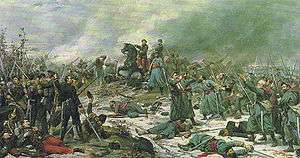Battle of Le Mans
| Battle of Le Mans | |||||||
|---|---|---|---|---|---|---|---|
| Part of the Franco-Prussian War | |||||||
 | |||||||
| |||||||
| Belligerents | |||||||
|
|
| ||||||
| Commanders and leaders | |||||||
| Prince Friedrich Karl of Prussia | Antoine Chanzy | ||||||
| Strength | |||||||
| 50,000 | 150,000 | ||||||
| Casualties and losses | |||||||
| 3,418 | 25,000 | ||||||
The Battle of Le Mans was a Prussian victory during the Franco-Prussian War that ended French resistance in western France.
Background
After the victory at the Battle of Orleans (1870), Prince Friedrich Karl of Prussia marched his army further to the west towards Le Mans. Antoine Chanzy had under his command about 150,000 soldiers stationed in Le Mans. The bulk of the pre-war professional French army had either been captured at the Battle of Sedan (1870) and the Siege of Metz (1870) or were bottled up in the Siege of Paris. Thus Chanzy's "army" consisted mainly of reservists and hastily conscripted civilians armed with a variety of obsolete civilian rifles or old military muzzle-loaders. Greatly outnumbering the German army, the French conscripts were nonetheless no match for the battle-seasoned Germans and Friedrich Karl did not hesitate to destroy them.
The Battle
The French army was greatly demoralized and ill-equipped. Much of the French ammunition had been soaked in the rain giving the Prussians a major advantage against the obsolete French gunnery. But Chanzy still ordered his forces into trenches prepared before Le Mans. The Germans hit the French left flank guarded by the Huisne River. The flank was turned and nearly routed until artillery and a counterattack halted the German attack. A bold German attack was launched on the French right flank, which fell apart. Corps commander Jean Bernard Jauréguiberry attempted to rally the broken troops to mount a counterattack but failed to do so. The French defense dissolved, the stragglers falling back into Le Mans.
Results
The battle had completely ended French resistance in the west. Friedrich Karl's supply lines were stretched thin and his army also was exhausted from its campaign along the Loire River that he did not pursue Chanzy. However, Chanzy's army was so demoralized and fatigued after the battle that it ceased to be an effective force and the fighting around the Loire came to an end.
Sources
- Howard, Michael The Franco-Prussian War: German Invasion of France MacMillan 1962
- History of the Franco-Prussian War
Coordinates: 48°00′15″N 0°11′49″E / 48.0042°N 0.1969°E